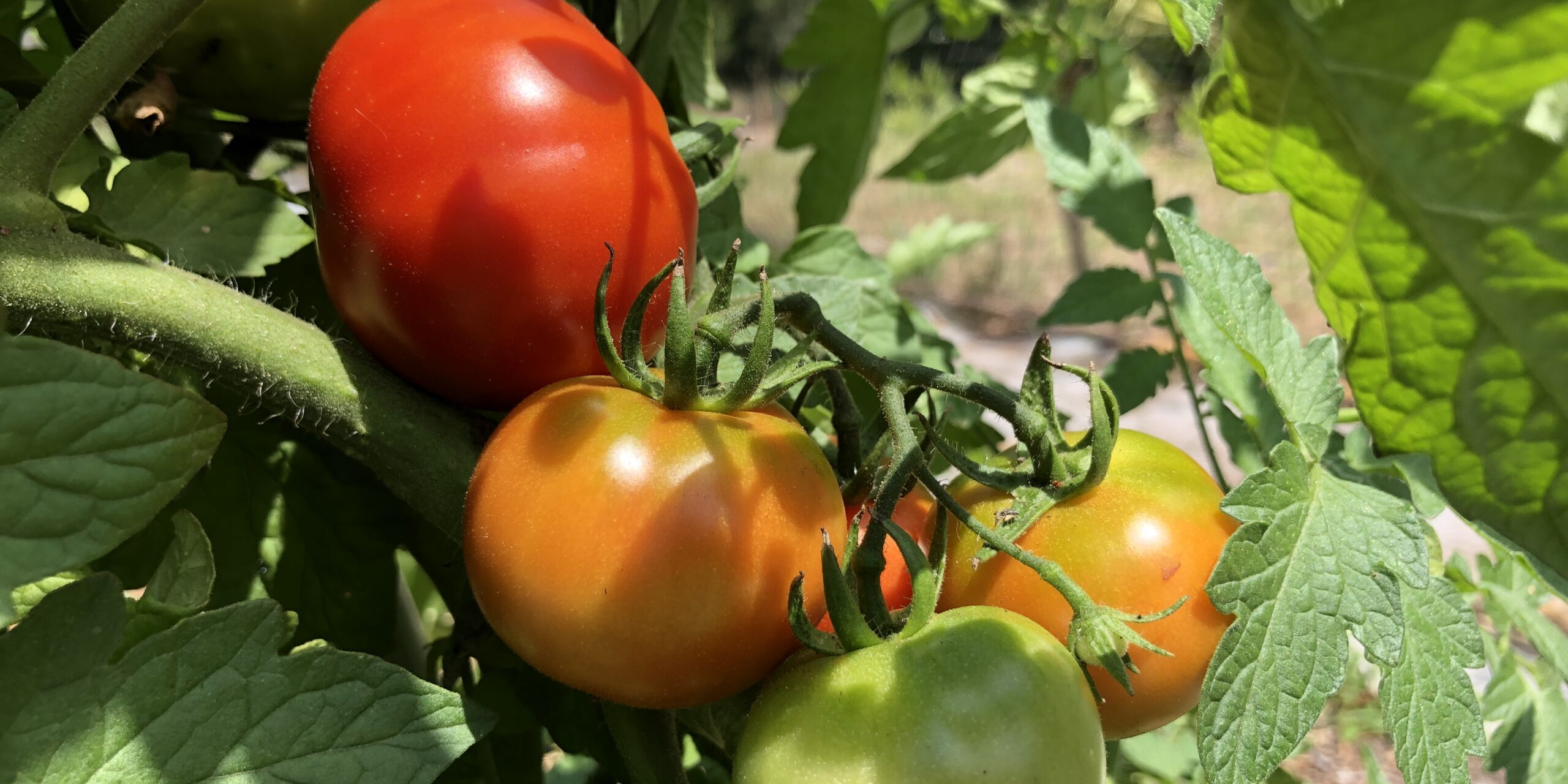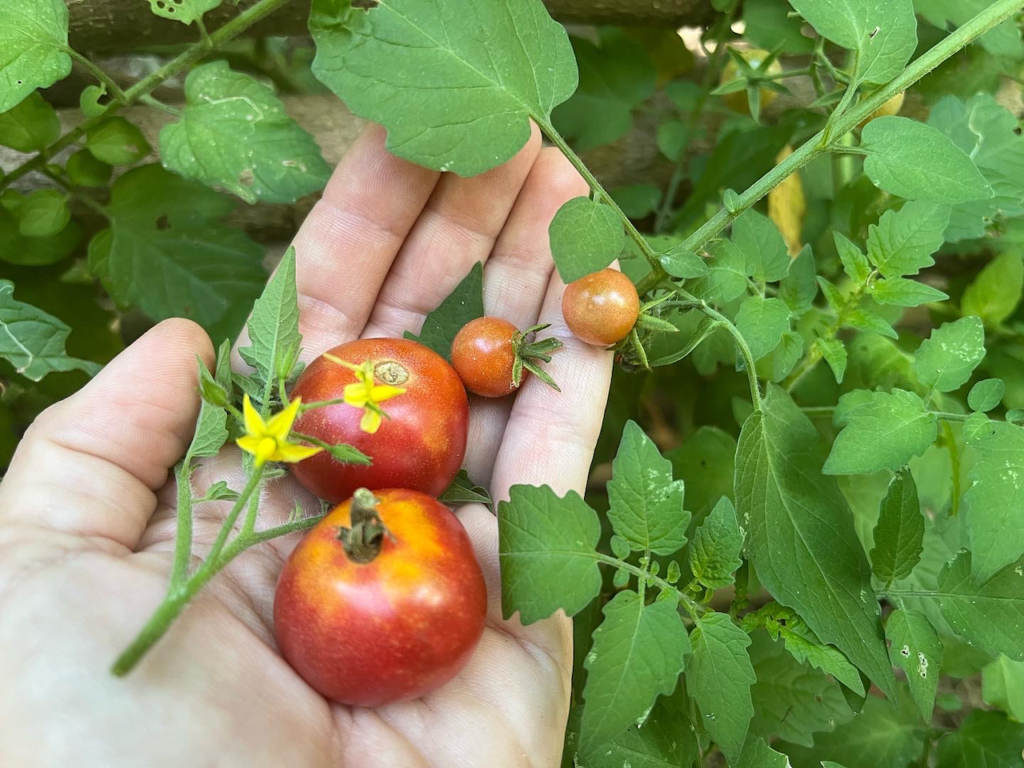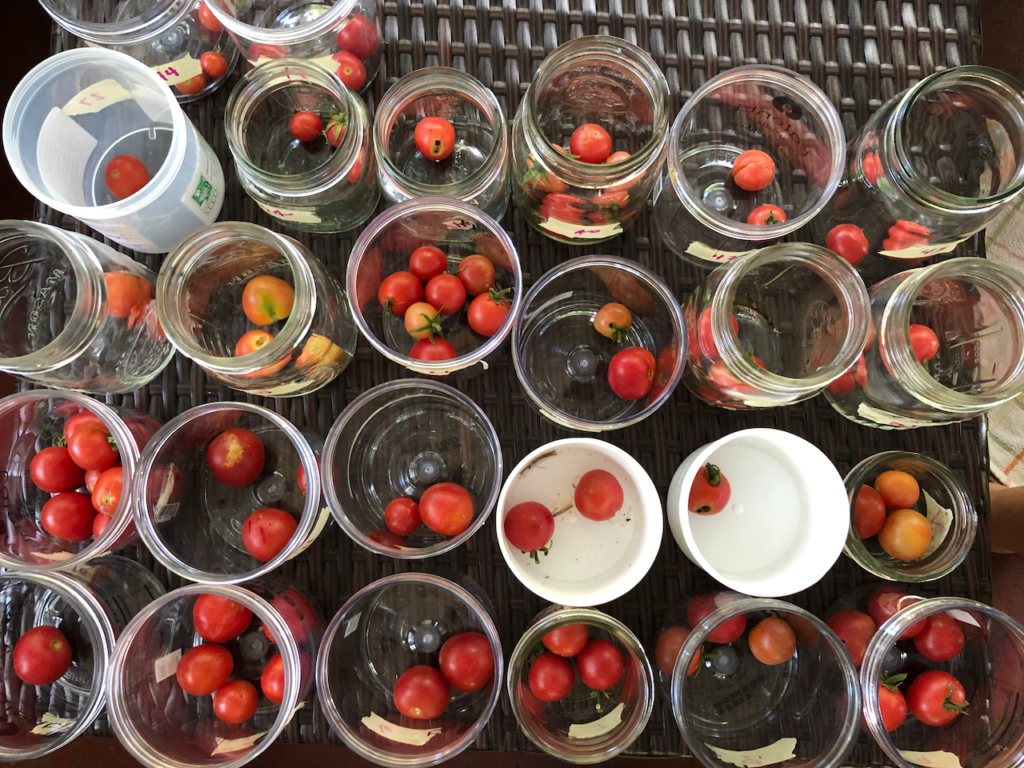How the Seed Was Planted
In 2015 we had an ambitious idea: what would happen if we tried to combine our beloved Everglades currant tomato with a dwarf variety, Tanunda Red? This is a very wide cross of tomato types and traits! Everglades is a different species altogether (Solanum pimpinellifolium) and is the wild ancestor of modern day tomatoes (Solanum lycopersicum) – but they can hybridize. If you’ve ever seen an Everglades growing it’s easy to see how they are still wild – sprawling, vigorous, many fruits and many seeds – in fact they will spread easily although never seem to become invasive. Birds seem to enjoy them, spreading them around the garden and neighborhood. They have great stress tolerance, excellent flavor, and grow well in Florida unassisted by the grower. The drawbacks are its sprawling form (although no trellising is required!) and tiny tomatoes that need to be eaten quickly as they do not store well.
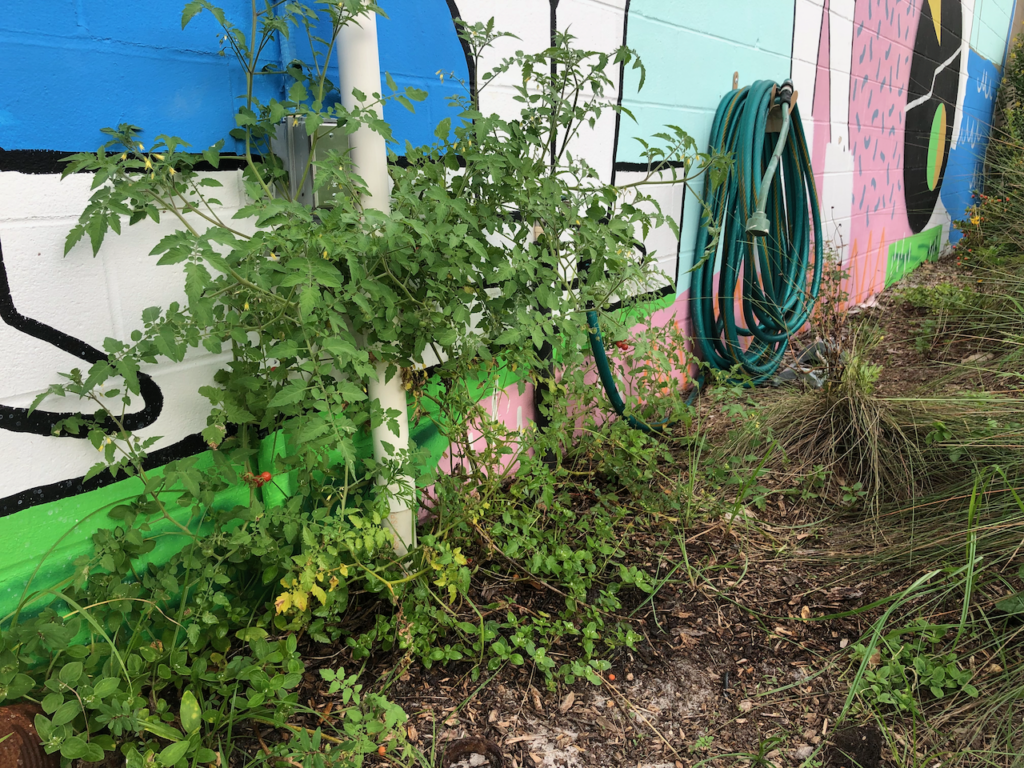
Not planted by a human, nor cared for at all, yet somehow managed to survive the harsh conditions of the Working Food courtyard. Notice the vigorous and vining habit and tiny fruits. No one watered or fertilized this plant that grew out of marginal soil in our full sun, hot microclimate in Gainesville.
Dwarf varieties are relatively new, but becoming more common thanks to efforts of the Dwarf Tomato Breeding Project. Tanunda Red is a determinate variety meaning that the fruits develop within a short window of time. Fruits are quite big ranging from 4-10 oz and of course it’s dwarf in stature. So it’s very different from the indeterminate, sprawling Everglades bearing teeny tiny fruits. Let the fun begin! Welcome to our Evvy Tomato Project!
The Everglades currant tomato pictured here with her offspring of the Tanunda cross, that resulted in what we’re calling the Evvy line. While they are no beefsteak-sized mater, the cherry tomatoes are now much more reasonable and meaty than the tiny marble sized fruits of the Everglades.
Goals and Progress to Date
The goal was to create a new variety that is great tasting and able to withstand the extremes of Florida’s growing conditions, but on a more compact dwarf-statured plant with bigger fruit.
Each growing season since that first F1 (first generation) in 2015 when Craig LeHouillier assisted making the actual hand-pollination cross between the two, we made selections that met our criteria – and now hold the F6 seeds (we skipped a couple growing seasons here and there if you’re doing the math). At this stage we are close to final evaluations and release of a new open-pollinated cherry tomato variety! Interestingly we have developed a new category of tomato form that is neither dwarf nor tall, but somewhere in between – a sprawling dwarf – although less sprawling than Everglades!
We have noticed some degree of resistance to army worms, a major pest of tomatoes, and we’re looking a little more closely at that this season. Wouldn’t that be something!? Last season, our friend Chris Smith of The Utopian Seed Project near Asheville, North Carolina noticed a particularly unusual trait- resistance to herbicides! Yep- some contaminated compost (a growers worst nightmare) impacted other crops including other tomato varieties, but not the Evvy tomatoes. We’re too afraid to replicate that trial, but maybe one day.
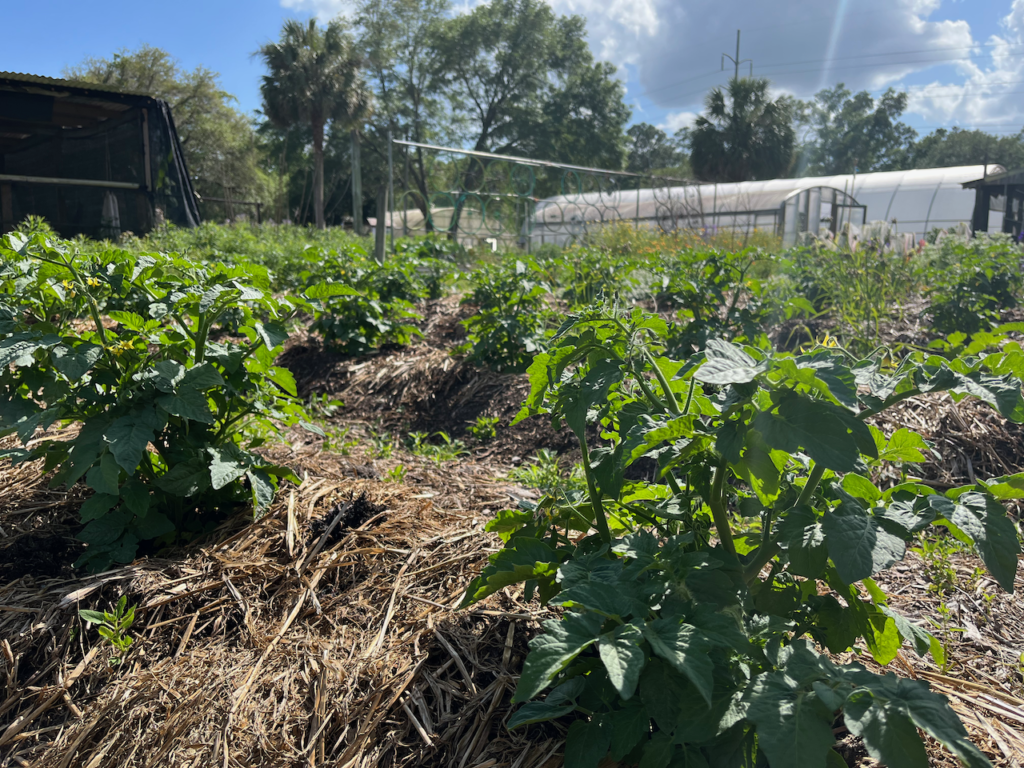
The Evvies! Much more compact than Everglades with the characteristic dwarf traits of being very stocky and robust, with rugose and dark green leaves. They still sprawl a bit but not nearly to the extent that Everglades does. Thus the new type of “sprawling dwarf”.
One downfall we’ve noticed is the occurrence of the less than desirable Everglades trait of fruit splitting in some of the plants. We’ll look closer this year and see if we can make selections against it. Sometimes this is an environmental thing – one of the many we can’t control. You know – sudden downpours that rapidly fill fruits with water beyond their ability to respond in time without bursting open their skin! But it can also be genetic, so we’ll keep observing.
Community Engagement and Collaborative Breeding
Since our work is all about community, accessibility, and providing plant varieties that are open-pollinated and open-source, we have been using a collaborative plant breeding approach, which is gaining popularity among our type of people in the plant breeding/seed saving community. Throughout the project, we invited community members to taste tomatoes which helped us decide which ones to move forward with. The flavor department is just as important as the growing department – but also the most subjective – one person’s worst tomato is another’s favorite! So more opinions gives better data. We even developed a TOMATO FLAVOR WHEEL to help guide tasters’ input. If you want to use it, feel free to download and share! Even during the height of the pandemic, we sent home tasting kits rather than inviting folks indoors to sample.
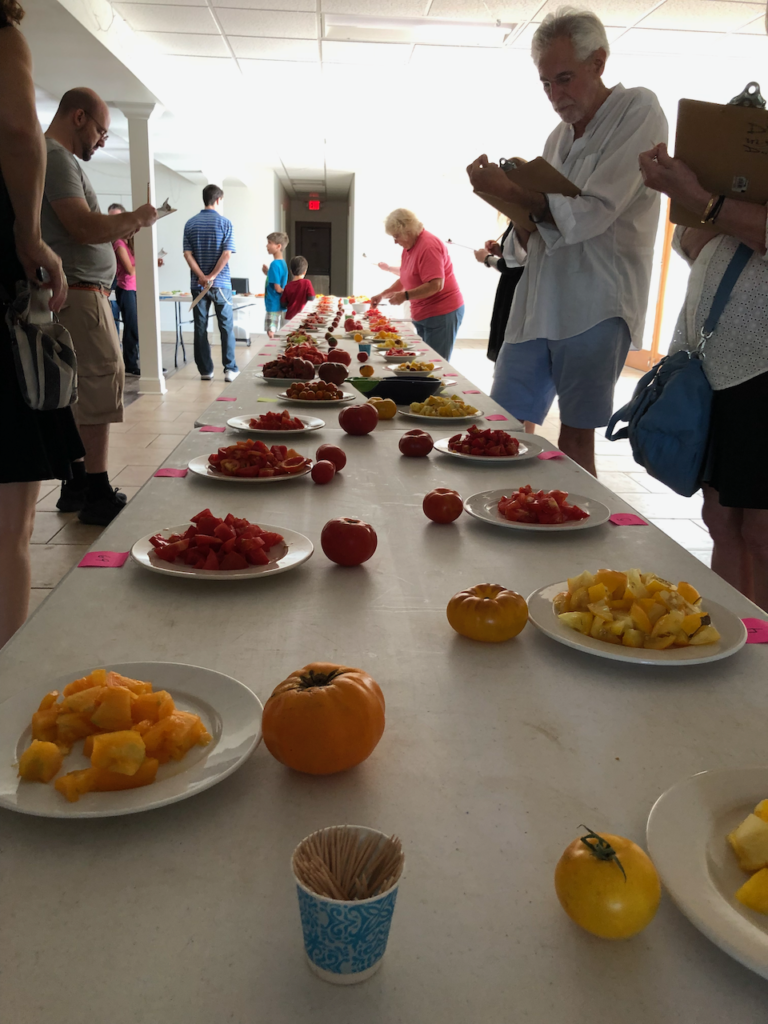
One of our most memorable tasting events pre-COVID at the Working Food Community Center! Over 100 varieties were in the mix, including some of Tim Noyes’ breeding lines from Gainesville, and our own Evvies. Spoiler alert: Sungold won in the taste department- they always do!
During the 2022 growing season, 30 individuals grew two of our unique selections that we offered, using the SeedLinked platform to gather the data. The invitation to try growing something really unique and brand new was fun for local gardeners, and a few came back this year to ask about growing them again! The feedback was a mixed bunch, which is expected from an activity that has so much variation in grower experience and acts of god we cannot control when it comes to growing plants! But overall we felt positive that we were on the right path, with a bit more work to do.
Fruits from individual plants were carefully separated, evaluated and seeds saved every year of the project. Thanks to Arunus for donating all these re-usable Talenti jars that made the harvesting and separating easy!
What’s Growing On Now?
We’ve narrowed down two single plant selections from the 2022 season, and are currently growing these out in two locations: Working Food’s seed gardens at GROW HUB and the Gainesville Giving Garden. Instead of the boring names: 39H and 39J which identify the lineage and progress of the project – we’re calling them Happy and Joy. As of the writing of this post, Happy and Joy are in the ground with flowers and the first little green fruits in both garden locations! Evvy#39 from last year went out to SeedLinked again, this time as part of a nationwide tomato trial so folks from all over will get a chance to try these in their gardens. It will be interesting to see what growers in different climates have to say about the Evvy tomatoes.
Our partners at the Gainesville Giving Garden have a really cool thing going on. If you haven’t heard of them, definitely check them out. In addition to providing free healthy and local produce to economically disadvantaged folks, they engage a cohort of young and eager to learn volunteers that help manage the garden. It’s a really beautiful oasis built atop an old parking lot, now filled with so much life from the soil to the people, it’s hard to believe it all happened so quickly! Two student volunteers have been assigned to help manage the Evvy tomatoes and we are grateful for their time, curiosity, and knowledge.
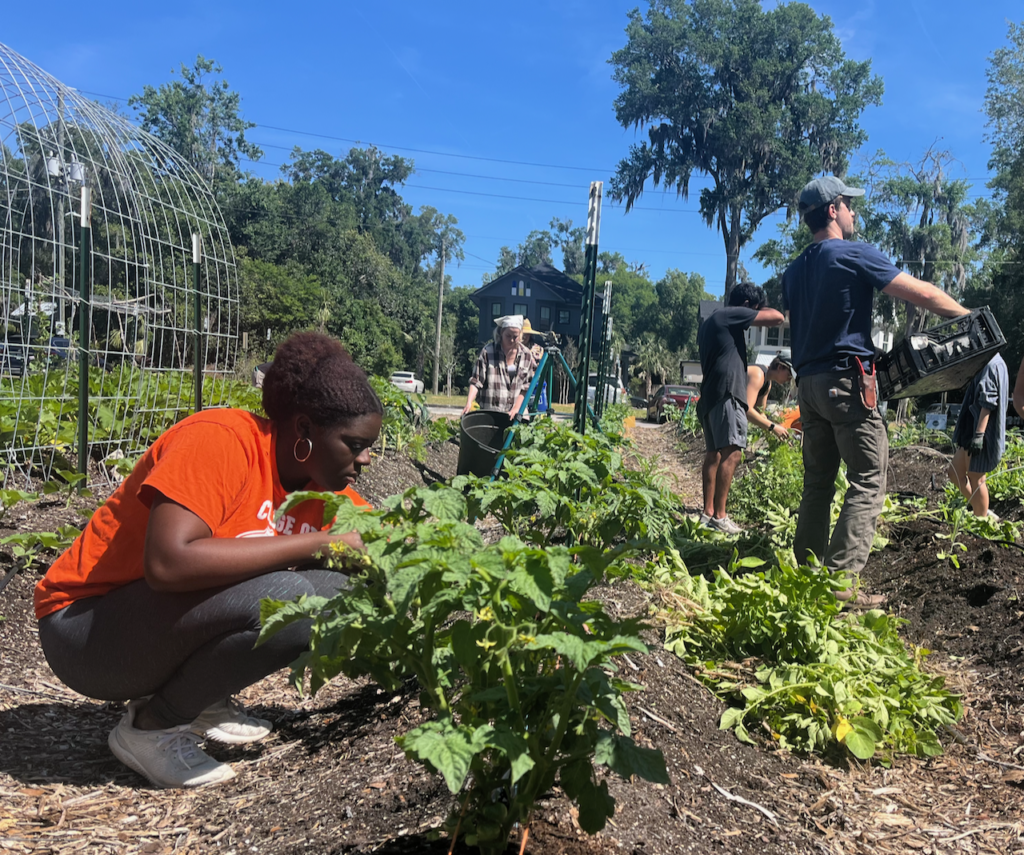
Sunday morning workday at The Gainesville Giving Garden! Volunteers helped to prune, mulch and fertilize the Evvy tomatoes. Young people get the chance to learn about growing vegetables, while donating all the produce to community members experiencing economic disparities and food insecurity.
By working collaboratively with a community of growers to provide adapted varieties, we continue growing the locavore movement with a supremely local food product- local food grown from local seed! Ultimately the increase in local growing and eating has beneficial effects for our community, environment, and economy. But it all starts with the seed!
Thank You!
We are grateful for the ongoing expertise and early inspiration of Craig LeHouillier of the Dwarf Tomato Breeding Project and author of Epic Tomatoes, as well as the advice and moral support from local tomato breeder and backyard gardener, Tim Noyes. In 2023 we were grateful grant recipients from the Organic Crop Improvement Association (OCIA) that is helping fund this season’s growth as well as our educational outreach events.
the ongoing expertise and early inspiration of Craig LeHouillier of the Dwarf Tomato Breeding Project and author of Epic Tomatoes, as well as the advice and moral support from local tomato breeder and backyard gardener, Tim Noyes. In 2023 we were grateful grant recipients from the Organic Crop Improvement Association (OCIA) that is helping fund this season’s growth as well as our educational outreach events.

